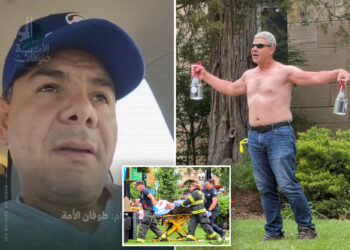Transcript:
John Edgar Wideman: The fullness of time. The fullness of time. That phrase has haunted me since I first heard it or read it, though I don’t know when or how the words entered my awareness, because they seem always to have been there, like certain melodies, for instance, or visual harmonies…
Beth Schwartzapfel: That’s John Edgar Wideman, Jacob Wideman’s father. He’s 82 now. Jake had been in prison seven years when John wrote this essay, called “Father Stories,” and in it, John reflected on how those years had passed: in an instant and, somehow, also, an eternity. “Time can drag like a long string,” he wrote, “studded and barbed, through a fresh wound.”
Jacob Wideman killed Eric Kane when they were both 16. When Jake was wrestling with heartache and suffering that he had shared with no one. Eric was just barely entering adulthood. He left behind a brother and a sister, parents who adored him.
I can’t know how time has passed for Eric’s family, but I wonder if they’ve experienced a similar phenomenon. Whether the day they lost Eric will always feel like a minute ago and impossibly long ago — fresh and painful, and an ancient hurt, at the same time.
John Wideman: The fullness of time. Neither forward nor backward. A space capacious enough to contain your coming into and going out of the world. Your consciousness of those events, the wrap of oblivion bedding them. A life, the passage of a life, the truest understanding measure, experience of time’s fullness…
Beth Schwartzapfel: Jake is 53 now, older than John was when he wrote “Father Stories.” At that time, Jake had a number he was counting down towards. Twenty-five years. His sentence was 25 years to life. Although he always knew it was possible he would live his whole life and die in prison, he also knew that after 25 years he could start making his case to the parole board. And that gave the time a shape. A destination.
Now, more than six years after he was brought back to prison, he has lost that destination. That checkered flag, flapping just past the horizon. And time just…passes.
When we talk about going to prison, the phrases we use inevitably involve the word time. “Doing time,” “serving time” — as if time were “a commodity like money that can be spent, earned, lost, owed, or stolen,” as Jake’s father, John Wideman, reflected in Brothers and Keepers, the book he wrote about his brother Robbie’s life sentence. But, as John writes, “incarceration as punishment always achieves less and more than its intent,” because, of course, you can’t take people’s time away. You can only make it more painful, more solitary, more slow. As John wrote,“no one does time outside of time.”
Jake and the people who love him are deeply aware of that. Especially as court filings and deadlines have come and gone.
Jake Wideman: It’s been a rough time. It really has been. Yeah. I mean, what is there to do except keep moving and keep pushing forward and keep hoping that things will be done correctly in the end.
Beth Schwartzapfel: It was December 2022 when Jake’s attorneys submitted their last special action, that appeal where they argued the parole board had treated him unfairly when it revoked his parole. Then, waiting. August of 2023 when the judge heard arguments in that case. Then, waiting. The judge was supposed to issue a ruling within 60 days. But it was more like 74 days, in mid-October, by the time he actually did. More waiting.
John Wideman: If it had been him sitting in a cell somewhere, or his son, or his daughter, or anybody he cared about, I would imagine each of those 24 hours would have meant something to him. Each one of the hours of the 24 would have meant something.
Jake’s mother, Judy, passed away in June, at 80, shattering Jake’s hope of ever seeing her again outside of prison. John is angry about a lot of things about Jake’s parole revocation, about how the system, as he sees it, bent to the will of the Kanes, but the judge’s delay was particularly frustrating.
John Wideman: …took his own good time. And the good time is my son’s time. The only, only time my son’s gonna have on, on Earth.
Beth Schwartzapfel: I’m Beth Schwartzapfel. From The Marshall Project and WBUR, this is Violation. A story about second chances, parole boards, and who pulls the levers of power in the justice system.
This is our eighth and final episode: The fullness of time
When we were making Violation last year, in the spring of 2023, we had no idea what this final episode might look like. Would we be covering a new parole board hearing, if the judge ordered that? Would we be standing outside the gates of an Arizona prison, watching Jake walk back out again, if the judge (in an unlikely, but not impossible scenario) ordered that? Or would we find ourselves here, right back where we started? With Jake sitting in prison, filing legal briefs and arguments and appeals, trying to get some judge somewhere to agree with his point of view that he should never have gotten locked back up in the first place.
Josh Hamilton: It’s just unfair what happened. And to the extent that I believe in this system, that it works, it needs to correct that unfairness, and I’m confident that it will.
Beth Schwartzapfel: Jake’s attorney, Josh Hamilton, said he plans to file an appeal shortly to the ruling issued in October by Judge Mark Brain. It could take a year or more for that process to run its course and for that court to issue a ruling. The new Governor is appointing new parole board members, as the ones appointed by prior Governors retire or move on, and maybe at some point the composition of the parole board will change enough that Jake will be willing to go before the board again, like he did all those years, and begin asking again for his freedom. But that would require him to abandon his legal appeals — something he’s not ready to do yet. So, for now, he will appeal again, and again, until he exhausts all the state courts, and then if need be he will begin appealing in federal court. That could be years, and years, and years, says Jake’s lawyer Josh Hamilton.
Josh Hamilton: I will not stop until either I’m dead, Jake’s dead, or he’s out.
Beth Schwartzapfel: To Josh, it looks like the state cut corners, committed “egregious constitutional and statutory violations” in putting Jake back in prison, he argued to the court. That’s not how the system is supposed to work, Josh says.
The board, of course, said it did no such thing. The board’s executive director declined to speak with me about it, because the case is ongoing, but in court filings, they said they followed all the rules, and that Jake’s “disappointment with the outcome of the second revocation hearing is not a basis for a due process claim.”
Josh Hamilton: I’ve lost sleep over this. It upsets my sense of — it calls into question everything I understand and believe in about the system.
Beth Schwartzapfel: Now, you might be rolling your eyes right now. Jake stabbed a defenseless kid, who was sound asleep, for no apparent reason. A 16-year-old who had barely begun to live his life, who went away to summer camp and never came home. We certainly heard from people who thought Jake had no business complaining about justice, or fairness.
Voicemail from listener: Hi, my name is Jenny…
This is a listener who called our phone line.
Voicemail from listener: …I don’t have a question, but it said to also leave an opinion on all of this, and, um, I believe the case was handled fairly, and that Jake got what he deserved.
Beth Schwartzapfel: The question of what Jake deserves is still unanswered — is unanswerable, really — because it depends on who you ask.
The Supreme Court has said that people who commit crimes when they are young should, in all but the most extreme cases, have another chance. And Jake was a kid when he killed Eric, a kid suffering from the effects of early childhood trauma and undiagnosed mental illness.
But how do you weigh all of those truths? In the fullness of time, does the right thing to do become any clearer?
John Warnock: Hello, Beth. This is John in Tucson. The question you asked, is there anything Jake can do to deserve being released, isn’t quite the right one. Jake has done more than enough to show that he deserves to be released, that justice would be served if he were to be released.
Beth Schwartzapfel: This is John Wideman’s old friend, retired English professor John Warnock, who has known Jake since he was a boy. He called our listener line, too.
John Warnock: The problem here is that the victim’s family is so relentless in its wish for retribution. Um, you can’t, you can’t fault them for that, but the state has an obligation to decide when it’s enough. They, we’re not in a system where the victim’s family gets to draw and quarter Jake.
Beth Schwartzapfel: There’s no evidence that the Kanes played a role in Judge Brain’s decision. But Professor Warnock is naming this sense among those in Jake’s family and his legal team that the Kanes’ very unusual degree of involvement in his case played a role in the very unusual way the Department handled it. The Kanes, you might remember, obtained data from Jake’s ankle monitor and submitted a lengthy report about alleged parole violations, and urged the Department’s top attorney to arrest Jake.
And when parole officers did arrest Jake, they did it because he left a message for a psychologist but could not reach him in time to make an appointment as requested by his parole officer. That psychologist, Dr. Jon McCaine, agreed with Jake that their missed connection did not feel like a good reason to bring Jake back to prison.
Dr. McCaine texted me in April. He wrote, “Episode 6 was a reminder of how incensed I was about his parole officer who had no interest in Jake’s well-being as far as therapy and was simply looking for any excuse to violate him. I continue to regret how I was used in this disingenuous display of concern for Jake’s transitional mental health needs.”
Jon McCaine: So it’s one thing to dispute an opinion, we’re used to that in forensics. Experts have different opinions. But what I’m not used to is somebody taking my opinion and bending it to represent an opposite opinion and then attributing that opinion to me.
Beth Schwartzapfel: McCaine, after all, was not only a psychologist who Jake was supposed to see on a particular date in order to satisfy his parole requirements. He is also, you know, A psychologist i.e., an expert in human behavior .
Jon McCaine: There was nothing that suggests any reticence or avoidance of him trying to set up an appointment with me, and I’m used to, and schooled in, being able to identify what that looks like.
Beth Schwartzapfel: But at the end of the day, it’s not up to McCaine what to make of their missed connection. It’s up to the corrections department, and the parole board. It’s up to people like David Neal.
David Neal: My name is David Neal. Now, I’m 74 years old, but I spent a total of 26 years in law enforcement…
Beth Schwartzapfel: Remember David Neal? He served on Arizona’s parole board in the late 2010s. He voted on Jake’s case twice — once in 2017, when the board officially revoked his parole and said he’d stay in prison indefinitely — and again in 2020, when a judge ordered a do-over of that hearing, and the board again revoked his parole and said he’d stay in prison indefinitely.
David Neal: It’s not surprising that a judge would deny him anything because he was…That sort of a person…(laughs).
Beth Schwartzapfel: David thought Jake was narcissistic, manipulative, self-centered, he told me.
David Neal: With Wideman, I’m, it’s hard to describe. When you’re, you know, how, when you’re talking to somebody, you know, a lot of nowadays they say, oh, well, his vibes are bad, but that’s the thing about Wideman. He came in and…
Beth Schwartzapfel: But he didn’t feel that way about everyone. At times he voted in favor of people who had committed very serious crimes.
David Neal: But I still think that, you know, people are rehabilitatable. We had a lot of prisoners came up, I mean, and for parole type, you know, they’re murderers or rapists or, you know, things like that. And they put a lot of effort into making themselves worthy of going back into public.
Beth Schwartzapfel: It’s remarkable to hear David say this. And bear with me while I tell you why. Because beyond his work as a cop, and then a crime scene investigator, and then a parole board member, David Neal also spent years volunteering for a group of people who lost family members to murder. Because he himself lost a family member to murder. It was actually a friend from this group that encouraged him to apply for a spot on the parole board, so he could bring a victim’s perspective to the board.
In 1999, Neal’s grandson Jerrad was beaten to death by his mother’s boyfriend.
David Neal: He was, uh, three when he got, you know, he turned three in May and then, and like, uh, you know, a month and a half later he got, that’s when he was killed.
Beth Schwartzapfel: After Neal’s son and his wife split, she and their two kids moved in with a man named Brad Rakestraw. Rakestraw is serving a life sentence for murdering Jerrad. He’ll never be eligible for parole.
David Neal: I, you know, I was pretty much law and order on the, on the, uh, police side of things all my life. And now all of a sudden, I’m, I’m, I, I got flipped really quick into a big-time victim side.
Beth Schwartzapfel: Neal says that of course it was hard for him when people came asking for parole who had killed kids. It was hard for him when people had killed cops, too. But he always gave people the benefit of the doubt, he said.
Before we go any further, let’s talk about why David Neal is no longer on the parole board. He was removed from the board in 2020, after he voted on Jake’s case — after he voted on hundreds of cases — after a human resources investigator sustained several allegations against him. According to the state investigation, “Mr. Neal has, on multiple occasions, made comments in regard to not believing in mental illness, that Psychology is not real Science, that all inmates are guilty and should never get out.” Also that “rural Mexicans tolerate child molestation.” An administrative law judge upheld his removal from the board in 2021. As part of the investigation, Neal responded that “there may be some slightly questionable behavior on my part,” but insisted many of the allegations were “false and verging on slanderous and possibly libelous.”
If and when Jake ever goes before the board again, the decision about whether he deserves to be free will rest with five people like David. Five complicated humans with tragedies and motivations and biases that even they might not understand. Whatever five people happened to suit the governor for whatever variety of reasons when there happened to be a vacancy on the board .
Did Jake get what he deserved? David was one of a very small handful of people who was actually in a position to answer that question. And his answer? Was, yeah.
David Neal: I always prided myself on being able to, I don’t want to say judge, but determine character of people, and fairly quickly. And being raised by a cop and then, you know, 26 years total in law enforcement and then go on a parole board, it’s like — but, uh, you know, I was pretty good at it. And some of those people coming from, you know, as soon as they come up there, you know, that this person is just not somebody you want back out in society.
And so … time … passes.
John Wideman: When you’re young, you don’t understand time. You, you, you know, it just comes to you. And then suddenly, you’re in, behind the bars, and, you know, what’s gonna happen to me? How long am I gonna be here? Um, and so, part of the fight of younger people, I think, as I notice in my brother and my, and my son, is, is denying time.
All I have to do is kick ass and, and, and, and make noise and, and maybe the time will go faster or maybe this time doesn’t even exist or maybe I can end it. But it doesn’t end.
Beth Schwartzapfel: John’s brother Robbie served almost 44 years of a life sentence before he was released at age 68. He was involved in a 1975 robbery that left one man dead, and though Robbie didn’t pull the trigger, he was convicted of second-degree murder and sentenced to life without parole. Pennsylvania Governor Tom Wolfe commuted his sentence in 2019.
John Wideman: The people they have become, the men they have become, the human beings they have become, uh, is partly making sense of those vast stretches of time in which they are — in which most people forget about them. I can’t, of course. And, if my writing has any effect, it would, one effect that I would hope it would be that, it reminds people that, the preciousness of time that is all any of us get.
Beth Schwartzapfel: Another person who has a lot of power over Jake’s future is this guy.
12 News Anchor: Governor Katie Hobbs made her pick last week for the toughest job in her cabinet. The state’s new prisons director will be Ryan Thornell.
Beth Schwartzapfel: Thornell took over promising a whole host of reforms, including revamping and expanding the prisons’ rehabilitation and job training programs and the prison healthcare system. He has a PhD in public policy, and he says he’s committed to following the research about what works.
Ryan Thornell: For me, it’s really about coming in and doing a few things. One, committing to being transparent and having open communication. So any, any person, staff member of the public who reaches out to me directly, gets a response from me.
Beth Schwartzapfel: I mean, an Arizona corrections director willing to answer my questions? Yes please!
Beth Schwartzapfel: What, what does a good parole officer do? What do they not do?
Ryan Thornell: What my hope is I think the direction that you would find our community corrections group going through now is really that case management, supportive model, the brokering of services model that is anchored in a level of accountability. And when, when I say accountability, I don’t mean the old, you know, trail them and jail them sort of approach of accountability. What I really mean is this idea of. You know, laying out a plan for an individual based upon whatever it is that they need and then helping them achieve that plan.
Beth Schwartzapfel: I asked Thornell how he instructs his parole staff to handle technical violations — failing a drug test, not checking in with your parole officer…missing an appointment — behaviors that may violate the rules of someone’s parole but aren’t crimes.
Ryan Thornell: We know that, by and large, a technical violation isn’t always, you know, a solid reason or a necessary reason to reincarcerate somebody. Our approach is we need to intervene the least amount possible for whatever that situation is.
Beth Schwartzapfel: As you can imagine, like, inevitably, this leads to my next question about Jacob Weidman, right? So he was re-arrested and re-incarcerated for not setting up an appointment with a psychologist. I know this was your predecessor, but look, but he’s still in prison in Arizona under your administration and your administration is still defending that in court as recently as August. Do you feel like he belongs in prison as a result of that technical violation?
Ryan Thornell: So I was certainly not going to discuss the specifics. As you mentioned, it’s still going through the court process,and it happened two administrations, uh, before me.
Beth Schwartzapfel: He’s right that it was two administrations because remember Charles Ryan? The former director who was in charge when Jake was re-arrested while on parole — the guy who had an armed standoff with police at his house? (By the way Ryan pleaded no contest last month to misdemeanor gun charges in a plea deal related to that incident.)
News Anchor: The former head of the Arizona prison system, accused of illegally firing a weapon, and pointing a gun at police cut a deal with prosecutors today.
After Charles Ryan retired in 2019, there was another director for two years, David Shinn, before Thornell began. Anyway…
Ryan Thornell: What I can tell you is, back to my, my point earlier, um, you know, our approach would be that when somebody’s behavior necessitates any level of intervention, the necessary intervention is what is least, and so in a situation that doesn’t warrant re-arrest, re-incarceration, we would figure out, you know, my expectation would be, we have a responsibility to figure out what we do with them in the community to keep them in the community and address whatever that concern is, whatever that behavior is, rather than re-arrest and re-incarcerate them.
Beth Schwartzapfel: It sounds like you’re saying, if you were in charge when that happened, this would not have been your approach? I don’t want to put words in your mouth. Is that a fair assessment of what you just said?
Ryan Thornell: I don’t know that there’s going to be a fair assessment. I wasn’t around when the situation was unfolding, right? So I only know certain parts of what happened, whatever the case may be, the facts might’ve been at the time. All I can tell you is what my approach is today. Um, how that situation fits into my approach, you know, not always apples to apples, but I will just reemphasize that my approach is we only re-arrest, we only re-incarcerate when it’s necessary. When there’s a public safety issue at play, when, when it’s warranted and the other interventions, the other efforts that we have at our disposal have failed.
Marta DeSoto: Last time I, you know, wear a sweatshirt, but then they said, No, you can’t wear a hood. Like, that’s a new one…
Beth Schwartzapfel: It’s a Saturday morning in Arizona, and Jake’s wife Marta is on her way to visit him at the state prison in Tucson. It’s been four months since her last visit.
Marta DeSoto: Now I get to like drink really nasty coffee. And just terrible hamburgers and burritos and all that nasty things.
Beth Schwartzapfel: Oh, it’s horrible.
Beth Schwartzapfel: Though Marta and Jake have been married for eleven years now, they’ve only ever spent a few months together outside of prison. She’s going to spend the day with Jake, eating bad food out of the prison vending machines and walking in circles around the yard, talking.
There were only a few months when Jake had his own apartment, and a lot of those nights Marta was at her own house with her kids. But the days they did spend together? They were beautiful, Marta said. In the car ride to the prison, she told her friend about how she and Jake would wake up early Sunday mornings to go hiking.
Marta DeSoto: We would just start tying our shoes, not even talk, you know, just tie our shoes and then just go. Like I would get in the car, we’ll trailhead and just start walking. And we would just be gone, you know, for two and a half hours. Then we’d get home. And we would make this awesome brunches. Like, I mean, omelets and bacon and pastries that we had bought.
Like, so we put, put this feast, right on the coffee table. And just start eating, you know? Like, it was just such a, like, a magical Sunday. Like, that was our favorite. That’s awesome. But, you know, those are the things that you kind of hold on to.
Beth Schwartzapfel: Marta lived in Phoenix for many years, but remember that local TV news expose about her that aired in 2016?
News clip from ABC15: It involves this convicted murderer and his wife, a woman who had an important job in our state and was paid a lot of taxpayer money.
Beth Schwartzapfel: Ever since that aired, Marta has not been able to work in Arizona. So a few years ago she moved to Michigan, where her sister lives, and she was able to find work. Every few months she flies back to Arizona to visit Jake. She arrives at the prison at dawn. Visiting hours don’t start until 8, but she wants to fill out the paperwork and get processed early so she’s first in line. Each time she visits, she walks through a metal detector, gets patted down, walks back and forth in front of a drug-sniffing dog. She rides a little jitney across the complex.
Marta DeSoto: This is like really kind of difficult to explain, but I don’t really look forward to it. Like I look forward to seeing him, but the whole process. Just the fact that I have to go through it. I almost feels like you’re complicit, you know, like there’s actually some legitimate reason of why he’s still there.
Beth Schwartzapfel: The last time she saw Jake was the day after the hearing in his special action — that hearing where the judge seemed so open to the arguments of Jake’s lawyers, asking questions about fairness and equity.
Marta DeSoto: The last time I was very excited because I just went through the hearing and there was a lot of hope, it was the day after the hearing, right? And, you know, this time it’s kind of like, really? Again? And there’s like no real end in sight. You know, you can’t say, okay, this date, we may know something. We don’t know anything.
Beth Schwartzapfel: The end in sight. That checkered flag. Even if it’s far off, knowing it’s there makes the waiting, the time, feel so much more possible. The judge’s recent ruling changed all that.
Beth Schwartzapfel: Is there any part of you that, I mean, you have a lot more options than Jake does, right?
Marta DeSoto: Mm-hmm, right?
Beth Schwartzapfel: I mean, is there any part of you that saw this and was like, you know what? Fuck it. I can’t do this anymore?
Marta DeSoto: Right. And that’s the thing. Like you go through that all the time and it’s just kind of like, I mean, it’s hard to explain because it’s such a, it’s such a hard relationship to maintain.
Beth Schwartzapfel: It’s not just that she’s in Michigan and he’s in Arizona. Not just that he’s in prison and she’s free, that they can only talk in 15 minute increments. It’s also that corrections officials are listening.
Automated recording: This call will be recorded and subject to monitoring at any time.
Beth Schwartzapfel: And they have used Jake’s conversations with Marta against him. Remember the time he told Marta he was angry about being brought back to prison, and the attorney for the prison system submitted a recording of that call to the board as evidence he was not safe to release?
Jake Wideman: She still to this day and completely understandably, and I’m 100 percent in support of this, is reluctant to share any news about, new things she may be looking into as far as career path and you know, things like that, because she’s afraid that, that people will turn around and try to sabotage her career and her aspirations in ways that they have before. Then there are times when I am reluctant to share the full depth of my emotional, you know, the texture of my emotional life because that has been used against me. And I’m, I’m quite frankly concerned about going to a parole hearing and having a piece of a phone call taken out of context.
Beth Schwartzapfel: So it’s these visits — eight hours at a time, every few months, the only time they can talk openly and privately about anything — that sustain them. And without an obvious endpoint, they have to be enough. Indefinitely.
Marta DeSoto: When I go through it and I start like getting all this, like, what am I doing? You know, how long is this going to be, blah, blah, blah, I have to like, go back to the time that we’ve had together and go back to the times that we’re able to talk and, and, you know, actually spend time together and how we enjoyed that time and, you know, the memories and everything. So you have to like, I mean, It’s an exercise in just, in just trying to keep that present because if not, if you just like not really think about it, you know, there’s like no reason why would I continue to do this?
Beth Schwartzapfel: Jake says he has faith that sometime relatively soon, he will be free again. He said there have been plenty of times that he put on a brave face and faked the kind of optimism that helps him and his loved ones get through difficult situations. But he’s not faking it now, he says. It’s real.
Beth Schwartzapfel: I mean, you’re, you know, you’re serving a life sentence. And what if, what if that’s it? What if those nine months were the only nine months you will get as an adult on the outside? I know it sounds like a terrible question and I’m sorry. I just was wondering if you have thought about that.
Jake Wideman: So, yes. I’ve had to face that possibility for over six years now, almost six and a half years now. And, there is no easy wrapping my head around that. There’s no easy way to look at that and just say, well, you know, what is there to do but power through? What is there to do but keep moving forward? What is there to do but focus on the good things in my life? You know, that I have here, the blessings, which are many. Yes, that is the way forward. That is the path forward. But it’s never as easy as that. There are moments all the time when I long for the freedom that I had. When I have to remember that I’ll never see my mom again, which is a big part of this. That I may never see my father, my brother, my sister, my wife, my stepchildren, all the people that I love, all the people that I care about, except in a prison setting. And that’s, that’s a possibility. But I can’t dwell on that, Beth. I can’t.
“Father Stories,” that essay in which John Wideman reflects on the fullness of time, is the last essay in a collection called Fatheralong. It’s a book about fathers and sons, about holding your family in great concentric circles of love across generations. About John traveling to the rural South Carolina town where his father’s people are from to try to understand something of what it means to be his father’s son, and John traveling to Arizona to try to understand something of what it means to be his son’s father.
John Wideman: So many lives, and each different, each unknowable, no matter how similar to yours, your flesh and not your flesh, lives passing as yours into the fullness of time, where each of these lives and all of them together make no larger ripple than yours, all and each abiding in the unruffled innocence of the fullness that is time.
Beth Schwartzapfel: The title is a sort of play on the title of one of John’s favorite gospel songs, “Farther Along.” Turns out he misunderstood the title for years.
(“Farther Along” by Sam Cooke plays)
Beth Schwartzapfel: But also turns out misunderstanding the title helped him understand something he had been after for years. “Farther along we’ll know more about it,” the lyrics go, “Farther along we’ll understand why. ”
Farther Along by Sam Cooke: Cheer up, my brother, live in the sunshine.
We’ll understand it all by and by.
Beth Schwartzapfel: The song is about being patient, accepting that there are things you don’t yet understand. And accepting that the more you can be patient, the better position you’ll be in to understand, when the time is right. And John reflects in the essay on the fact that one way or another, he would take his place in the long line of ancestors that conspired to make him him and Jake Jake. Being the father of a son who took the life of another father’s son with his own two hands — being the father of a boy who suffered silently, invisibly — being the father of a son who went to prison a boy and emerged, briefly, as a man — is all about holding him with love and patience, and knowing that the truth, inasmuch as there is such a thing, would become clear, farther along.
I don’t know if anything has become clearer for the people who loved Eric Kane. I don’t want to presume that there was any kind of peace or understanding for them, by and by. All we can know is that he’s been gone for almost 40 years. His parents are in their 80s now, too, and his siblings have children of their own.
John Wideman: All the things that mattered so much to you were them sinking into a dreadful, unfeatured equality that is also rest and peace. Time gone, but more, always more. The hands writing, the hands snatching, hands becoming bones, then dust, then whatever comes next. What time takes and fashions of you, after the possibilities, permutations, and combinations. The fullness in you is exhausted, played out for the particular shape it’s assumed.
For a time in you, for you, you are never it, but what it could be. Then is not, you are not lost, but ventured, gained, stretched, more, until the dust is particles, and the particles play unhindered, unbound, returned to the fullness of time.



























